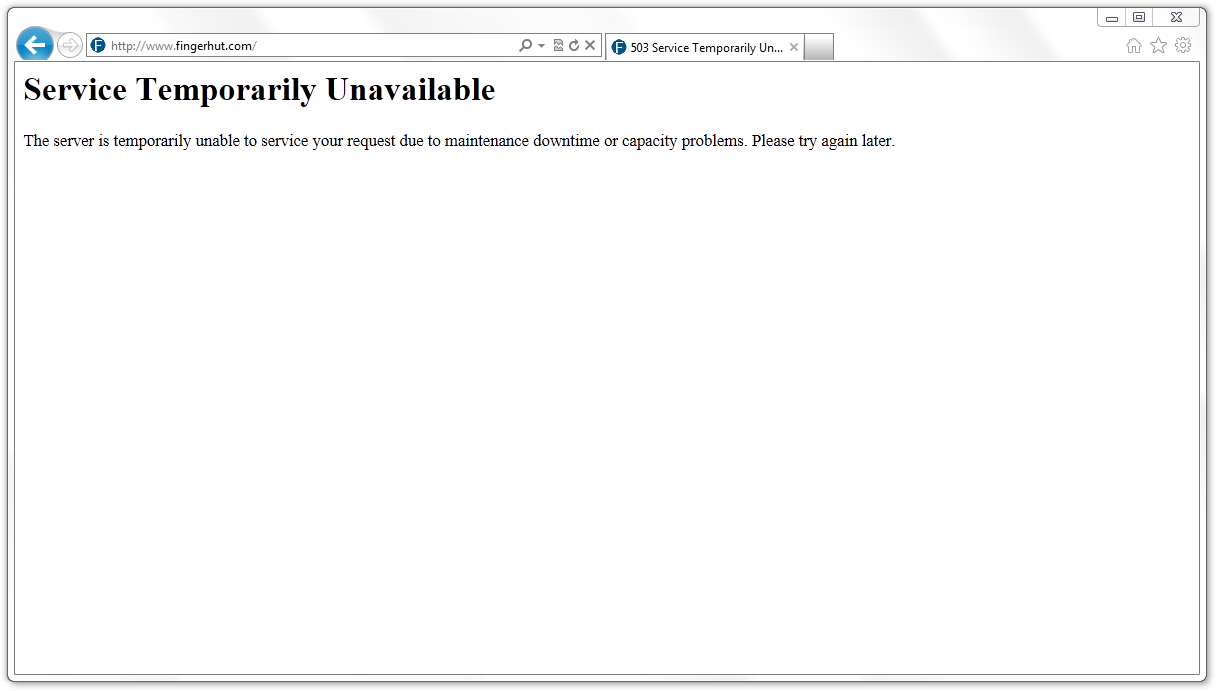Could a lack of Black Friday website outages in 2012 indicate e-commerce has hit middle-age?
At this point during the holiday season of Black Friday 2012 and Cyber Monday 2012 online retail websites are more stable, but slower, and have increased in size, according to our monitoring and data we’ve seen. Moreover, these same websites are increasingly composed of a family of third-party hosted elements, that are “cooler” but are often less stable than the website itself. While 2012 didn’t see Black Friday website outages in the manner of 2011, there is an apparent e-commerce shift, perhaps indicative of a middle age. (Free instant test of webpage, third-party hosts, and widget speed here)
To wit, at this point the online retail websites of Black Friday 2012 look:
- Older, but more stable: In general, compared to Black Friday 2011, when there were several high-profile Black Friday website outages (Victoria’s Secret & Walmart), large online retail website appear to be experiencing fewer online holiday outages in 2012. So far, there were few high-profile online Black Friday website outages for large online retailers in the early 2012 holiday shopping season. In fact, to-date the outage of the phone-based FBI National Instant Background Check System (NICS) on Black Friday due to a record number of gun purchases appears to be the highest profile outage so far in the online shopping 2012 season.
- Stability remains a challenge for a few: Despite the relative stability of many large online retailers this Black Friday 2012 season at least one large retailer struggled with sever capacity issues during Cyber Monday 2012, a peak 2012 online buying time. For example, Fingerhut experienced intermittent server capacity issues throughout Cyber Monday 2012. As a result, navigating to the web site resulted in a “Service Unavailable” screen notice for some browsers during on the most important online shopping days of the year. (Free instant test of server performance here.)

- Slower and fatter: According to a report in Internet Retail Magazine, the median page load time of 6.5 seconds of the top 2000 e-commerce websites in Explorer 9 is 9% slower than last year’s median of 5.94 seconds, according to data gather by Strangeloop Networks, a web optimization company. (Free test of your webpage load time in Explorer 9 here) Moreover, the Strangeloop report also noted the top sites were even slower than the average with the top 100 e-commerce sites dropping load time speeds by 12%. Finally the report noted that the average size of the e-commerce websites had increased by 5% in 2012 over 2011. In fact, based on ongoing data accumulated at HTTParchive.org/trends.php and generated by WebPageTest.org (full disclosure, Dotcom-Monitor is a sponsor of WebPageTest) web page load times, and the sizes of requested elements are definitely trending upward with nearly a three-fold increase since 2008 (HTTParchive.org/trends.php).
- The family is increasing… third-party hosted elements and widgets abound: The number of HTTP requests due to web page elements (social media widgets, seals, fonts, tracking codes, image servers etc..) served to websites by third-party hosts is increasing dramatically. From 2008 to 2012, the number of objects in the average top 1000 web page has more than doubled from 49.9 to 100 objects per page in November 2012 and the number of external objects has doubled, according to a recent article summarizing web analytics at WebsiteOptimization.com These third-party hosted elements are often used to improve a user’s experience on Black Friday. On the one hand, the third-party elements are used to improve user experience by instilling a sense of trust/security (seals), or interactivity/social (chat apps, social media widgets), or design (fonts, images), or performance improvement processes/revenue generation (content delivery networks (CDNs), ad networks) and analytics/marketing (tracking codes, cookies) data. On the other hand, often each these third-party hosted elements result in their own HTTP requests to these third-party servers resulting in an exponential increased exposure to network issues, domain name server (DNS) issues, server problems, application issues, and human errors. (Test the speed of your third-party hosts and widgets here.)
- New third-party page elements, cool, but less stable than their parent pages: On Black Friday 2012 the performance quality of those new “cool” third-party hosted web page elements varies considerably depending on the time of day, interactions with other page elements, and the third-party element provider. In as much as some third-party applications and elements are the result of existing companies creating new web application products and other web elements are new companies pushing new web element and systems, the performance tends to vary. In general, companies using these new web elements do so in service to “improving user experience,” via functionality or design. However, during the Black Friday 2012 season our monitoring indicates that the performance of third-party hosted elements negatively impacting performance at the websites’ they are designed to improve is a particular area of concern as the number of external objects increases.
Web application monitoring for preventing Black Friday website outages in 2013
Again, Black Friday 2012 and Cyber Monday 2012 online retail websites are more stable, but slower, and have increased in size, according to our monitoring and data we’ve seen. Moreover. these same websites are increasingly composed of a family of third-party hosted elements, that are “cooler” but are often less stable than the website itself. Looking ahead for preventing Black Friday website outages in 2013 top retail websites will be using a variety of cutting-edge processes, including web application monitoring. This UserView Monitoring will help to online retailers retain the gains in stability, increase website speed, and re-assume some of the stability, control, and performance lost to third-party elements in the pursuit of cool.
See our other posts following Black Friday Website Outages and Cyber Monday Website Slowdowns.


